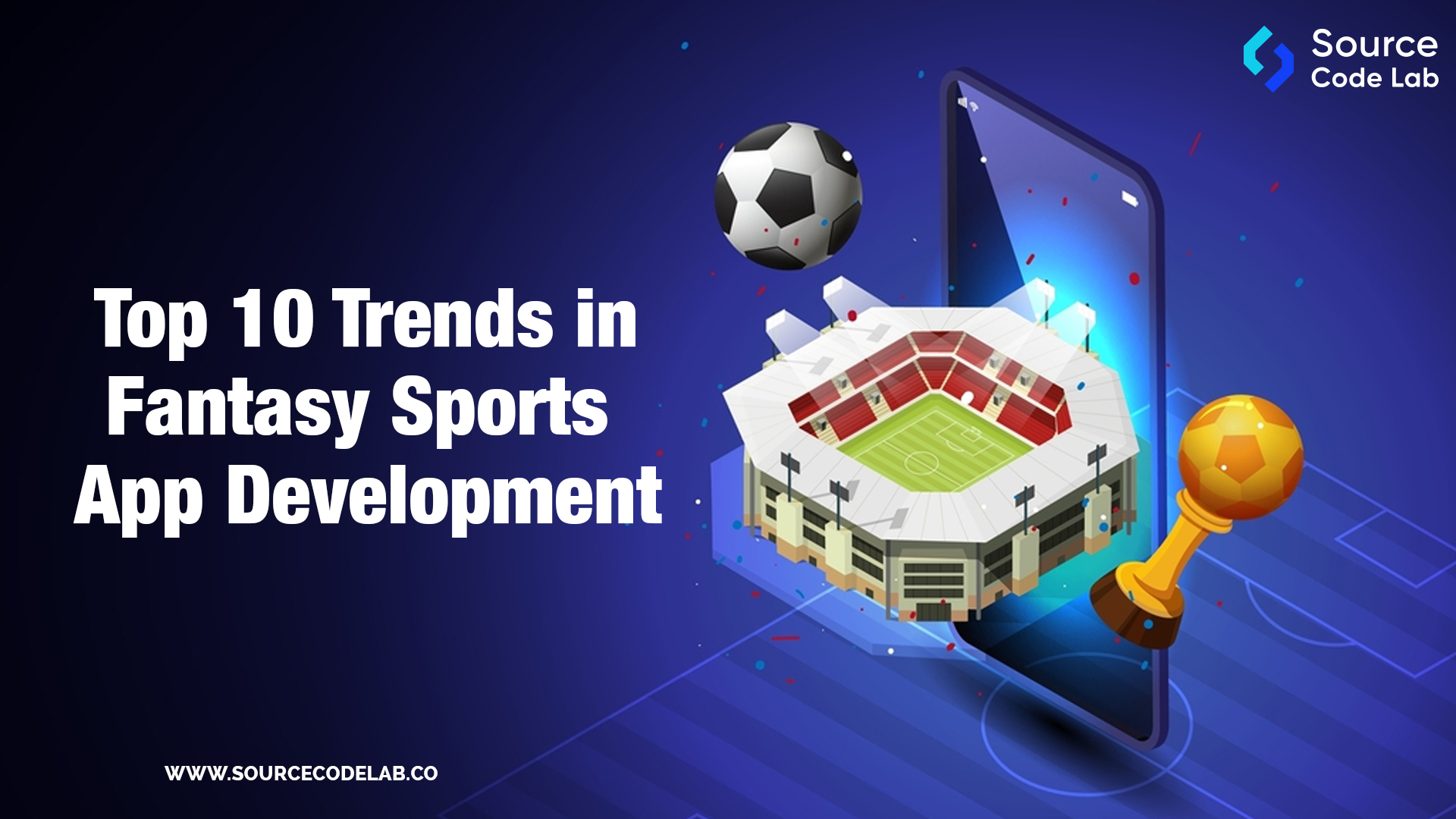Top 10 Fantasy Sports App Development Tech Trends & Innovations

Quick Summary
Exploring the top trends in fantasy sports app development shows an exciting and evolving field driven by new technology and user-focused design. From AI-powered personalization to blockchain for transparency and security, each trend is shaping the future of fantasy sports apps, making them more user-friendly and engaging. In this blog, we’ll look at the hottest tech trends in Fantasy Sports App Development.
Whether you’re a big fantasy sports fan, an experienced user, or an entrepreneur looking to invest in this growing market, this blog is a must-read. We’ll give you the knowledge you need to navigate the exciting future of fantasy sports apps.
Fantasy sports is a worldwide sensation, with its market size projected to reach $49.53 billion by 2028, according to Mordor Intelligence.
Introduction
Fantasy sports apps are undergoing a revolution driven by cutting-edge technologies like artificial intelligence, machine learning, and augmented reality. These advancements aren’t just bells and whistles; they’re fundamentally changing how fans engage with sports and their favorite teams.
The key to success in Fantasy Sports App Development lies in crafting immersive experiences, fostering vibrant communities, and empowering users to make informed decisions.
Blockchain technology ensures transparency and security, social features build passionate communities, and gamification elements add a competitive edge.
In this blog, we’ll delve into the hottest tech trends shaping Fantasy Sports App Development Company. Whether you’re a die-hard fantasy sports fan, a seasoned user, or an entrepreneur looking to invest in this booming market, this blog is a must-read. We’ll equip you with the knowledge to navigate the exciting future of fantasy sports apps.
What is Fantasy Sports?
Fantasy sports are a booming industry, captivating fans by allowing them to take on the role of a virtual general manager. Users draft teams of real-life professional athletes from a particular sport, with these teams competing against each other based on the athletes’ actual performance in real-world games.
Here’s the breakdown for fantasy app development:
Drafting & Management:
Users leverage their knowledge and strategic thinking to build their dream team through a drafting process. Fantasy apps facilitate this by providing comprehensive player profiles, statistics, and draft rankings.
Lineup Optimization:
The ability to adjust lineups based on upcoming matchups and player projections is crucial. Fantasy apps empower users to manage their teams effectively, potentially offering features like injury updates, suggested lineups, and waiver wire recommendations.
Real-Time Scoring & Stats:
The heart of the fantasy experience is the thrill of watching your virtual team rack up points based on real-life athlete performance. Fantasy apps provide real-time scoring updates, in-depth statistics, and leaderboards to keep users engaged and informed.
Fantasy sports come in various formats, catering to all types of players.
From casual leagues among friends to highly competitive environments with intricate scoring systems, fantasy apps need to be adaptable to meet diverse user needs.
Top 10 Trends in Fantasy Sports App Development

1. AI-powered personalization
AI-powered personalization is transforming the fantasy sports industry by providing customized experiences and recommendations to users based on their preferences, behavior, and past data.
Artificial intelligence (AI) algorithms analyze vast amounts of user data, including past game selections, player performance, and user interactions, to understand individual preferences and behaviors.
With this insight, fantasy sports apps can deliver personalized recommendations for player selections, game strategies, and contests that align with each user’s interests and objectives.
AI-powered personalization enhances the user experience by providing relevant and timely content that resonates with each user.
For example, users may receive customized player suggestions based on their favorite teams, positions, or player statistics. AI algorithms can predict player performance and game outcomes, enabling users to make informed decisions and optimize their fantasy teams for success.
2. Blockchain technology
Blockchain technology is transforming the fantasy sports industry by offering transparency, security, and trust through a decentralized network. Leveraging blockchain ensures that all transactions, including payments, prize distributions, and player selections, are tamper-proof and transparent.
Smart contracts, driven by blockchain technology, automate transactions, removing the need for intermediaries and lowering the risk of fraud or manipulation.
Blockchain enhances data security by encrypting user information and preventing unauthorized access or tampering.
Users can trust that their data and transactions are secure, fostering confidence and trust in the fantasy sports platform. Additionally, blockchain technology enables seamless cross-border transactions and facilitates global participation in fantasy sports contests, opening up new opportunities for fans and players worldwide.
3. Social integration
Social integration is essential for fostering community engagement and creating vibrant ecosystems within fantasy sports apps.
Integrating social features such as chat rooms, forums, and social media integration allows users to connect, interact, and share their passion for sports with like-minded fans from around the world.
These social features enable users to create and join leagues, compete against friends, and share their achievements and insights with their social networks, enhancing camaraderie and competition within the community.
Social integration also facilitates user-generated content, such as user-generated leagues and challenges, which adds depth and variety to the fantasy sports experience.
By building a strong community of passionate fans, fantasy sports apps can enhance user retention, drive user acquisition, and create a more engaging and immersive experience for all users.
Social integration is a fundamental aspect of fantasy sports apps, allowing users to connect, compete, and celebrate their passion for sports together.
4. Machine Learning for Real-Time Information
To play fantasy sports effectively, users require the latest information, such as real-time scores and player statistics. In fantasy football app development, integrating machine learning models ensures that live scores, scorecards, player statistics, and other critical information are updated in real-time.
Machine learning analyzes data collected from live sports events to provide accurate and timely updates within the app.
5. Generative AI in Commentary and Chatbots
Generative AI, a prominent subset of AI, is revolutionizing the fantasy sports industry. Top fantasy sports app development company leverage generative AI to offer sports commentary in users’ preferred local languages.
This feature helps users understand live games better, enhancing their ability to play fantasy football efficiently.
Moreover, generative AI enhances customer service by empowering chatbots to provide 24/7 support. These AI-driven chatbots offer tailored responses to users’ queries, such as historical statistics of athletes or current match scores, significantly improving user experience in fantasy football apps.
6. Gamification for Enhanced Engagement
Gamification has emerged as a powerful tool for enhancing user engagement and retention in fantasy sports apps, particularly in fantasy football app development. By incorporating gamification elements such as badges, leaderboards, achievements, and rewards, developers can motivate users to participate actively and compete with enthusiasm.
Gamification adds a layer of excitement and competition to the fantasy football experience, encouraging users to set goals, track their progress, and strive for mastery.
Leaderboards allow users to compare their performance with friends and peers, fostering healthy competition and social interaction within the community.
Additionally, gamification fosters a sense of progression and achievement, keeping users engaged with the app over the long term.
By leveraging gamification, fantasy football apps can transform the user experience into a fun and engaging journey where every achievement and milestone is celebrated. This approach drives increased user participation and satisfaction, making the app more appealing and successful.
7. Predictive Analytics and Data Visualization
Predictive analytics and data visualization are transforming how users engage with fantasy sports apps by offering essential insights and strategic advice for informed decision-making.
In the realm of fantasy app development, advanced analytics algorithms analyze vast amounts of data, including player statistics, historical performance, and game trends, to predict future outcomes and optimize user strategies.
Data visualization tools simplify intricate data sets into visual formats like charts, graphs, and heat maps, enabling users to quickly recognize patterns, trends, and opportunities.
These tools, combined with predictive analytics, empower users to make informed decisions in fantasy sports, whether it’s drafting players, adjusting lineups, or strategizing during games.
By providing users with actionable insights and real-time updates, fantasy sports apps enhance user engagement and satisfaction, fostering a deeper connection between fans and the sports they love. With predictive analytics and data visualization, users can gain a competitive edge and maximize their chances of success in fantasy sports contests, turning data into wins.
8. eSports Integration
The integration of eSports into fantasy sports apps is expanding the gaming experience and attracting a new generation of users. eSports, involving competitive video gaming tournaments, have gained immense popularity worldwide, with millions of viewers and players participating.
Fantasy sports apps are capitalizing on this trend by offering eSports contests alongside traditional sports leagues.
Now, users can draft teams of professional gamers and compete in eSports tournaments for cash prizes and bragging rights. This integration diversifies the gaming experience, catering to a broader audience of gamers and sports enthusiasts.
Moreover, it offers an opportunity for fantasy sports apps to differentiate themselves in a crowded market and attract users passionate about gaming and eSports.
9. Cross-Platform Compatibility
Cross-platform compatibility is increasingly vital in fantasy sports app development Services, ensuring a smooth user experience across diverse devices and operating systems.
Users expect seamless access to their fantasy sports apps from smartphones, tablets, and desktops without encountering compatibility issues.
Developers achieve cross-platform compatibility through responsive design, ensuring that the app layout and features adapt automatically to fit different screen sizes and resolutions. Cloud-based solutions and APIs facilitate data synchronization across devices, allowing users to switch between platforms seamlessly while retaining their preferences, settings, and game progress.
This compatibility enhances accessibility and convenience for users, enabling them to engage with their favorite fantasy sports app anytime, anywhere, on any device.
10. Voice-Activated Personal Assistant
A voice-activated personal assistant is instrumental in assisting users during their participation in fantasy sports. Similar to Siri for iPhone and Alexa by Amazon, this voice-based assistant operates on voice commands, offering hands-free access to fantasy sports information and updates.
Users can inquire about live scores, player statistics, match updates, and more, all through voice commands. Additionally, users have the convenience of creating and managing their fantasy teams using voice commands.
These advancements represent the latest technological trends in fantasy sport App Development. Fantasy sports businesses must stay abreast of these trends to continually enhance the user experience.
Cost of developing a fantasy sports application

The price range for developing a fantasy sports application typically starts at $30,000 and can go up to $100,000 for more advanced features. The final cost depends on various factors:
Features:
The cost increases based on the complexity and number of features you want in your app. For example, if you’re including sports betting functionality, it will require additional resources and time.
Technology Stack:
Choosing between native app development and cross-platform development affects the overall cost. Native development usually costs more.
Testing:
Allocating resources for testing is crucial for ensuring app quality and functionality. Testing costs vary based on the scope and complexity of the tests required.
Security:
Investing in robust security measures is essential for protecting user data and preventing cyber threats. Implementing security features can add to the development cost.
Developer Location:
Hourly rates vary depending on the developer’s location, which influences the overall development cost.
Conclusion:
At Source Code Lab, we understand the importance of leveraging cutting-edge technology to create immersive and engaging fantasy sports experiences. As a leading fantasy sports app development company, we are committed to staying at the forefront of innovation, delivering bespoke solutions tailored to the unique needs of our clients.
Whether it’s integrating AI-powered personalization, implementing blockchain for transparency and security, or enhancing social integration and community building, our team of experts is dedicated to bringing your vision to life.
Partner with Source Code Lab to transform your fantasy sports app idea into a reality that captivates users and drives success in the dynamic world of fantasy sports.
Source Code Lab is a premier Mobile Game Development company based in India. We excel in providing outstanding mobile game design solutions, including those for eSports applications. If you need a partner to transform your idea into reality, reach out to us.
FAQs
What are the key features of a fantasy sports app?
Key features include user registration and authentication, team creation and management, live score updates, player statistics, leaderboards, chat and social features, payment integration, push notifications, and analytics.
Which sports can be included in a fantasy sports app?
Common sports include football (soccer), American football, basketball, baseball, cricket, hockey, and eSports. The app can be tailored to include any sport with a significant following and available player performance data.
How do you ensure the app complies with legal and regulatory requirements?
Compliance involves understanding and adhering to local and international laws regarding online gaming and gambling. This includes age restrictions, licensing, data protection laws (such as GDPR), and ensuring fair play and transparency within the app.
What technology stack is used for fantasy sports app development?
The technology stack typically includes front-end technologies (like React or Angular), back-end technologies (like Node.js, Ruby on Rails, or Django), databases (like MySQL, MongoDB, or PostgreSQL), and cloud services (like AWS or Google Cloud). Integration with third-party APIs for real-time sports data is also crucial.
[joli-toc]




































